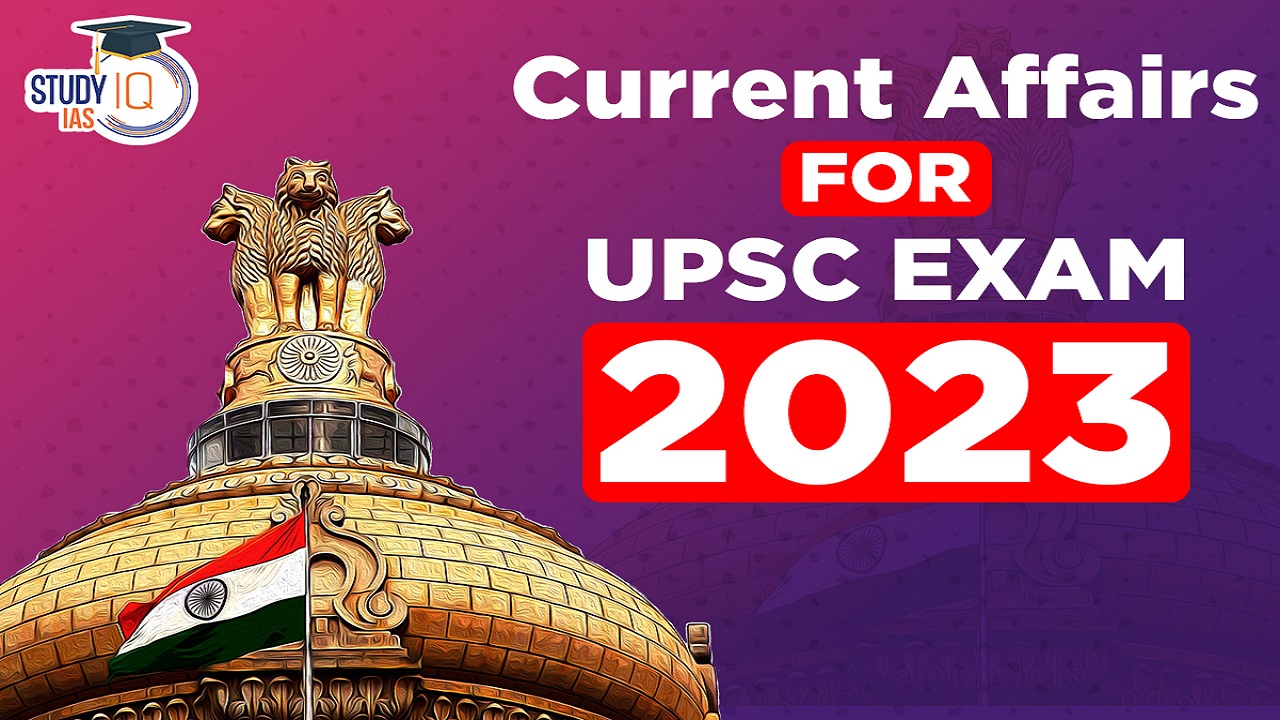Current Affairs 28th September 2023 for UPSC Prelims Exam
RoDTEP Scheme
Context: The Union Government has extended support under RoDTEP scheme till 2024 from earlier 2023 deadline. The extension has been done as global economic challenges have led to a slowdown in major economies, affecting India’s exports.
Remission of Duties and Taxes on Exported Products (RoDTEP Scheme)
- Definition: It provides a mechanism to reimburse taxes, duties and levies (at the central, State and local level) that are:
- incurred by exporters in the production and distribution process and
- are not refunded under any other mechanism.
- Objective: Aim to boost the domestic exports and replace the export incentive scheme Merchandise Exports from India (MEIS) scheme.
- Nodal Ministry: Ministry of Commerce
- Features:
- Scheme includes the direct cost incurred by the exporter and also the prior stage cumulative indirect taxes on goods.
- It is a WTO compliant Scheme.
- Follows the global principle that the taxes/duties should not be exported.
- All exporters of goods are eligible to take benefit under this scheme.
- There is no turnover limit criterion for claiming the benefit under the Scheme.
- Now extended to steel, pharmaceuticals, organic and inorganic chemicals sectors that were earlier excluded from the scheme.
- Form of benefits: The benefit under scheme is in the form of transferable duty credit scrip, or in the form of electronic scrip which is maintained in the electronic ledger.
Current Affairs 27th September 2023 for UPSC Prelims Exam
Social Impact Bonds (SIBs)
Context: National Bank for Agriculture and Rural Development (NABARD) raised Rs 1,041 crore through its Social Impact Bond (SIB).
More on the News
- NABARD SIB is first externally certified AAA-rated (highest rating by the credit rating agencies such as CRISIL and ICRA) Indian Rupee social bond in the country.
- The bonds issued privately to institutional investors will be listed on the Bombay Stock Exchange.
- Projects eligible for funding: Projects related to affordable housing, food security, employment generation, green building, energy storage, smart grids, etc.
Understanding Social Impact Bonds (SIBs)
- SIB is a type of financial instrument that provides capital to the public sector to fund projects that will create better social outcomes.
- Through SIBs, governments typically enter into agreements with social service providers, such as NGOs, and investors to pay for the delivery of pre-defined social outcomes.
- If the predefined social outcomes are successfully achieved within a set timeframe, the government repays the investors.
- However, if these outcomes are not met, investors may not receive a return on their investment.
- UK-based Social Finance Ltd introduced the first social impact bond in 2010.
- India’s first SIB was co-created by the Pimpri-Chinchwad Municipal Corporation and UN Development Programme in 2020.
How do SIBs differ from conventional bonds?
- SIBs are designed to address specific social issues and achieve social outcomes, while normal bonds are used for various capital-raising purposes.
- SIBs carry higher investment risk as returns depend on social outcomes, whereas normal bonds are lower-risk investments with fixed returns.
- SIBs are not influenced by interest rate or market risk, while normal bonds are subject to market fluctuations and interest rate changes.
NFTs (Non-Fungible Tokens)
Context: In 2021, NFTs were quite popular, with some selling for millions and people seeing them as a new way to own and invest in digital assets. However, currently many NFTs have become worthless.
More on News
- Russia’s invasion of Ukraine has shocked both traditional finance and crypto markets, causing investors to become more fearful regarding NFTs.
- Inflation and mass layoffs in the tech sector are other factors that may have reduced the zeal for NFTs.
NFTs (Non-Fungible Tokens)
- Definition: NFTs are digital assets that can be used to establish the ownership and value of an underlying digital asset, such as an original image, video or audio.
- Anything that can be converted into a digital form can be an NFT like photos, videos, GIF, music, in-game items, selfies etc.
- Working of NFT: NFT works on blockchain as it gives users complete ownership of a digital asset.
- For instance, a sketch artist can convert his digital asset to an NFT by getting a proof of ownership which cannot be edited or modified by anyone, powered by Blockchain.
- First NFT: Terra Nulius was the first NFT on Ethereum Blockchain.
- Use:
- NFTs are mainly used to confirm ownership because it’s hard to find and prove who owns digital work, making it easy for others to copy and devalue it.
- NFTs can have only one owner at a time.
- NFT owners can also digitally sign their artwork and store specific information in their NFTs metadata which will be only viewable to the individual who bought the NFT.
- Importance: NFTs are gaining massive popularity now because they are becoming an increasingly popular way to showcase and sell one’s digital artwork.
- Criticism:
- NFTs are unregulated assets that are part of a highly volatile market, so investors are not protected in case of a loss or legal action against the founders.
- Many of the NFTs are being sold on centralized marketplaces like OpenSea that are actually pirated versions of original paintings, which were minted as NFTs without the owner’s permission.
- In order to validate NFT transactions, crypto mining is done, which requires high powered computers that run at a very high capacity, affecting the environment.
Difference between NFT and Cryptocurrency
- NFTs and cryptocurrencies are very different from each other though both are built on Blockchain.
- Cryptocurrency is a currency and is fungible, meaning that it is interchangeable.
- For instance, if you hold one crypto token like one Ethereum, the next Ethereum that you hold will also be of the same value.
- NFTs are non-fungible, that means the value of one NFT is not equal to another. Every art is different from other, making it non fungible, and unique.
Blockchain Technology
- Blockchain is a distributed digital ledger that stores data of any kind.
- The transparency and the security offered by this technology is the main reason for cryptocurrency becoming so popular.
- Use: Being used in the retail, manufacturing and banking sectors as it eliminates middlemen, provides data security, reduces corruption and improves the speed of service delivery.
Amnesty International & FATF
Context: Amnesty International has accused Indian authorities of using FATF recommendations to suppress activists and civil society groups, obstructing their work.
More on News
- In Its report, Weaponizing Counter-Terrorism: India’s Exploitation of Terrorism Financing Assessments to Target Civil Society, Amnesty International has said that the Indian government has used the recommendations of FATF to put indiscriminate sanctions on the civil society.
- India has made amendments in Foreign Contribution Regulation Act, Prevention of Money Laundering Act and Unlawful Activities (Prevention) Act in response to the FATF assessments.
- These laws have been amended without adequate public and legislative consultation.
- These laws subject Non-Profit Organisations (NPOs) to burdensome administrative requirements and make them vulnerable to arbitrary arrest and prolonged detention.
- For instance, the report referred to the amendment to the Foreign Contribution Regulation Act where all NPOs were made to open accounts in Delhi.
- The government data itself showed that 92.3% of the NGOs in India were registered in states other than Delhi.
- This requirement proved to be burdensome for many NGOs.
Financial Action Task Force (FATF)
- Definition: FATF is an inter-governmental body that has developed standards to prevent and combat money laundering and terror financing.
- Background: It was established in 1989 during the G7 Summit in Paris to develop policies against money laundering.
- Objective: To establish international standards, and to develop and promote policies, both at national and international levels, to combat money laundering and the financing of terrorism.
- Members: FATF members include 39 countries, including US, India, China, Saudi Arabia, UK, Germany, France, European Commission and Gulf Co-operation Council. India became a member of FATF in 2010.
- Governance:
- FATF Plenary: It is FATF’s decision-making body and meets three times per year.
- FATF President: The FATF President is a senior official appointed by the FATF Plenary from among its members for a two-year period.
- Headquarters: Paris, France.
- FATF Lists:
| Black List |
|
| Grey List |
|
Amnesty International
- Definition: The Amnesty International is a non-governmental organization that was formed in July 1961, in London, United Kingdom by the lawyers-Peter Benenson and Philip James.
- Aim: Amnesty draws attention to human rights abuses and campaigns for compliance with international laws and standards.
- Work Areas: The major areas that are covered by the Amnesty International include:
- Women’s, children’s, minorities and indigenous rights
- Ending torture
- Abolition of the death penalty
- Rights of refugees
- Rights of prisoners of conscience
- Protection of human dignity
- Award: The organisation was awarded the 1977 Nobel Peace Prize for its ‘campaign against torture,’ and the United Nations Prize in the Field of Human Rights in 1978.
- Headquarter: London
United Nations Group of Friends for Digital Cooperation
Context: Five member states of the Digital Cooperation Organization (DCO) have launched the “United Nations Group of Friends for Digital Cooperation” on the sidelines of the 78th UN General Assembly meetings.
About the United Nations Group of Friends for Digital Cooperation
- Members of the Group: Saudi Arabia, Bahrain, Cyprus, Pakistan, and Rwanda.
- The initiative aims to lead global support and sustainable growth for the digital economy, enabling prosperity and social inclusivity for all on a global scale.
- It will boost global digital economy efforts by launching initiatives, projects, and events.
About the Digital Cooperation Organization (DCO)
- The DCO is a global multilateral organization that aims to enable digital prosperity for all by accelerating the inclusive growth of the digital economy.
- It was founded in 2020 by seven member states: Bahrain, Jordan, Kuwait, Nigeria, Oman, Pakistan, and Saudi Arabia.
- It has since expanded to include Morocco, Djibouti, Cyprus, and Rwanda.
- Headquarters: Riyadh, Saudi Arabia.
- The DCO brings together governments, the private sector, international organizations, NGOs and civil society to enable more inclusive digital transformation and the growth of digital industries.


 NDA 1 Admit Card 2025 Out at upsc.gov.in...
NDA 1 Admit Card 2025 Out at upsc.gov.in...
 Daily Quiz 02 April 2025
Daily Quiz 02 April 2025
 LIGO India Project, Working and Signific...
LIGO India Project, Working and Signific...





















